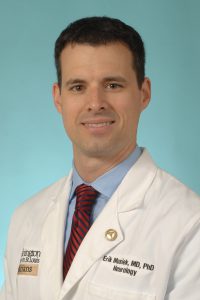Alumni Profile: Erik Musiek, M.D., Ph.D. (’07)
by Abin Abraham (M2)
 Dr. Erik Musiek, MD, PhD
Dr. Erik Musiek, MD, PhD
Assistant Professor of Neurology
Washington University School of Medicine in St. Louis
Vanderbilt MSTP Graduate, 2007
Dr. Musiek entered the Vanderbilt MSTP in 2000 and completed his thesis work in the lab of the late Dr. Jason Morrow, with Dr. BethAnn McLaughlin in Neurology as a co-mentor. He worked on mechanisms linking oxidative stress and neurodegeneration. Dr. Musiek did his internship in medicine at Vanderbilt, then went to the University of Pennsylvania for Neurology residency, where he worked in the lab of Dr. Garret FitzGerald. In 2011, he moved to Washington University in St. Louis, for a fellowship in Dementia and a post-doc in Dr. David Holtzman’s lab. He was awarded a K08 in 2012 and joined the faculty at Washington University in St. Louis in 2013. He now has his own (fledgling) lab with 5 people, and uses cellular and murine models to examine circadian clock systems in the brain, how they influence neurodegeneration, and why they go awry in diseases such as Alzheimer’s Disease. Aside from lab, Dr. Musiek is involved in clinical research through the Knight Alzheimer’s Disease Research Center at WashU, sees outpatients in the Memory Disorders clinic, and attends periodically on the neurology consult service. Dr. Musiek says “It’s an exciting but stressful time, as I am now awaiting funding of my first R01 and am submitting my first 3 manuscripts as senior author. My goal is to develop novel neuroprotective therapies or strategies for age-related neurodegenerative diseases.”
Having been trained as a physician-scientist, how do you split your time between these two professions? How did you come to make this decision?
I am ~80:20 research. I have clinic one afternoon a week and do a month of inpatient service a year. I think that if you are planning to run a reasonable lab, it’s really hard to do more clinical work than this and have any idea what is going on with your research.
What do you see as the relationship between scientific and clinical pursuits as a physician-scientist? What advice would you give about marrying the scientific and clinical pursuits?
I see patients with Alzheimer’s Disease, and my research is on Alzheimer’s Disease on a more mechanistic level. The topic is the same, but there is a lot of conceptual distance between my clinic and my lab. However, the clinic experience helps me understand the actual disease, which I think keeps my basic research much more grounded in reality and translation-focused. This is, in my opinion, where physician-scientists add value. Having a foot in the real world of medicine gives you a much better idea of the important issues associated with a disease, much more so than if you just read about the disease in journal articles. I think this helps one pick better questions to pursue.
Reflecting on your journey thus far as a physician-scientist, what has been the most impactful training experience that helped to establish your career?
The PhD training, because it sets the stage for the future and piques your interest in research. If you go into residency energized about research from your PhD days, it’s much easier to stay interested or involved in research through residency. It takes commitment to remain involved in research and moving forward with your research career as you go through years of clinical training, and it’s very easy to fall off the research track during that time.
Mentorship is a crucial component of both medical and scientific training. What advice would you give to MSTP trainee about selecting the best mentor?
This is a critical issue. I recommend having at least one physician-scientist mentor. MD or MD/PhD researchers understand the demands of the dual focus and also often have a bit more translational outlook that is valuable. When you chose your post-doc/fellowship mentor, it’s crucial to find someone with a track record of producing successful trainees who have gone on to independent careers (preferably someone who has trained K-awardees). Someone might be doing the coolest research and be HHMI and everything else, but if he/she hasn’t produced successful people with K awards and faculty positions, then keep looking.
What factors must an MSTP student consider in choosing a field of scientific research and clinical training for residency?
Ask yourself these things: Are people in this field doing the type of research I want to do? Are they publishing good papers and getting funded? Are there mentors? Is there a culture of research in this field? Is there a culture of supporting the careers of researchers? Is the clinical workload compatible with a research career? Is there a lot of pressure to produce clinical revenue in this field that will interfere with my research?
What does it mean to be an effective scientist? What does it mean to be a skilled physician?
To me, being both means accepting that I can’t be all things to all people. I will often encounter clinicians who know more medicine than I do and scientists who know more science than I do. But by keeping clinical practice my expertise must be narrow and focused, and my research devoted to developing new ideas with a translational bent, I think I can bring something unique and valuable to the table.
Please feel free to add any other advice, thoughts, or commentary you may have!
Something I didn’t realize is that as you move into residency, fellowship, and beyond, if you want to do research, you need salary support. Find programs that have T32 grants that can fund your salary, or consider grant programs during residency that fund salary during fellowship (such as R25). Money is freedom (from clinical work). You can have the greatest scientific ideas in the world, but if you’re stuck in the hospital 80 hours a week, they may never see the light of day.